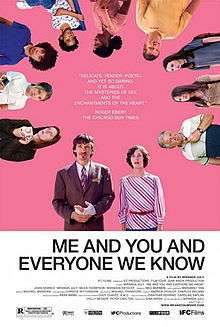Me and You and Everyone We Know
| Me and You and Everyone We Know | |
|---|---|
 Theatrical release poster | |
| Directed by | Miranda July |
| Produced by | Gina Kwon |
| Screenplay by | Miranda July |
| Starring |
Miranda July John Hawkes Miles Thompson Brandon Ratcliff Natasha Slayton Najarra Townsend Carlie Westerman JoNell Kennedy |
| Music by | Michael Andrews |
| Cinematography | Chuy Chavez |
| Edited by |
Andrew Dickler Charles Ireland |
Production company | |
| Distributed by | IFC Films |
Release dates |
|
Running time | 91 minutes |
| Country | United States |
| Language | English |
| Box office | $8 million[1] |
Me and You and Everyone We Know is a 2005 American romantic comedy-drama film written and directed by Miranda July (her directorial debut) and stars July, John Hawkes, Miles Thompson, Brandon Ratcliff, Natasha Slayton, Najarra Townsend, Carlie Westerman, and JoNell Kennedy.
Plot
The structure of the film consists of several subplots which all revolve around an intertwined cast of characters.
The film begins by introducing Richard (John Hawkes), a shoe salesman and recently separated father of two. After being thrown out by his wife Pam (JoNell Kennedy), he gets an apartment of his own to share with his children, Peter (Miles Thompson) and Robby (Brandon Ratcliff). He meets Christine (Miranda July), a senior-cab driver and amateur video artist, while she takes her client to shop for shoes, and the two develop a fledgling romantic relationship.
Robby, six years old, and his 14-year-old brother, Peter, have a joint online chat which he later depicts in another chat session as "))<>((", an emoticon that means "pooping back and forth, forever." This piques the interest of the woman at the other end and she suggests a real life meeting.
Two of Richard's teenaged neighbors, Heather (Natasha Slayton) and Rebecca (Najarra Townsend), develop a playful relationship with a much older neighbor Andrew (Brad William Henke) who works in the shoe store with Richard. He does not say much, but he keeps leaving signs on his window about what he would do to each of them. As a result of this relationship, Heather and Rebecca ask Peter if they can practice oral sex on him, so that he can tell them which of the two does it better; so they do. He says both were exactly the same. The daughter of a neighbor peeks in the window, sees what is happening, and quickly leaves. Heather and Rebecca later come to the neighbor's house intending to have sex with him as practice, but he appears afraid when he sees them through his window and he pretends not to be home.
Meanwhile, Christine's work is rejected by a contemporary art museum, but then later accepted by the curator, who turns out to be the woman who was instant messaging with the brothers.
The plots come together in the end, with Peter developing a friendship with the daughter of a neighbor, having been introduced to the hope chest that she has, Christine and Richard displaying a show of mutual acceptance of their attraction to each other, and, as a final plot device, Robby finding that the noise he had awoken to early every morning was that of an early-rising businessman tapping a quarter on a street sign pole. When asked why he is doing it, he stops and turns around, saying "just passing the time", and gives Robby the quarter. When his bus drives away and Robby tries it out himself, the sun heightens with each tap, time literally passing as he does it.
Cast
- Miranda July as Christine Jesperson
- John Hawkes as Richard Swersey
- Miles Thompson as Peter Swersey
- Brandon Ratcliff as Robby Swersey
- Natasha Slayton as Heather
- Najarra Townsend as Rebecca
- Carlie Westerman as Sylvie
- JoNell Kennedy as Pam
- Brad William Henke as Andrew
- Tracy Wright as Nancy Herrington
- Hector Elias as Michael
- Ellen Geer as Ellen
- Jordan Potter as Shamus
- Colette Kilroy and James Kayten as Sylvie's mom and dad
Production
The film was shot using a Sony HDW-F900 CineAlta high definition digital video camera.[2]
The score, composed by Michael Andrews, was performed largely on a modified Casio SK-1 sampling keyboard.
On-line chat scenes were filmed with open-source Gaim software, now known as Pidgin.
Reception
The film received largely positive reviews; it currently holds an 81% 'fresh' rating on Rotten Tomatoes, with the consensus stating, "Miranda July's debut feature is a charmingly offbeat and observant film about people looking for love."[3] On Metacritic, Me and You holds a 76, indicating "Generally favorable reviews".[4]
The film won the Caméra d'Or at the Cannes Film Festival.
Portions of the script were included in the anthology The Best American Nonrequired Reading 2006 edited by Dave Eggers.
Roger Ebert cited it as the fifth best film of the decade.[5]
References
- ↑ http://www.boxofficemojo.com/movies/?id=meandyouandeveryoneweknow.htm
- ↑ IMDb Technical Specs.
- ↑ Me and You and Everyone We Know at Rotten Tomatoes
- ↑ Me and You and Everyone We Know at Metacritic
- ↑ Ebert, Roger (December 30, 2009). "The Best Films of the Decade". rogerebert.com. Archived from the original on June 9, 2013. Retrieved June 9, 2013.
External links
- Me and You and Everyone We Know at the Internet Movie Database
- Me and You and Everyone We Know at AllMovie
- Me and You and Everyone We Know at Box Office Mojo
- Me and You and Everyone We Know at Rotten Tomatoes
- Me and You and Everyone We Know at Metacritic
| ||||||||||||||||||